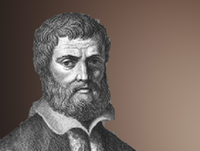An innovator in the medical field but also a great scholar of ancient treatises, Taddeo Alderotti was one of the most highly regarded university professors of the 13th century. Thanks to him, Medicine became a university discipline.
 Born in Florence in 1223 to a family of humble origins, Taddeo Alderotti took up medicine late in life. He soon found his own paths, and this led to a rapid and renowned career. In 1260 he moved to Bologna, where he began teaching Fixica, or Anatomy, to medical students.
Born in Florence in 1223 to a family of humble origins, Taddeo Alderotti took up medicine late in life. He soon found his own paths, and this led to a rapid and renowned career. In 1260 he moved to Bologna, where he began teaching Fixica, or Anatomy, to medical students.
These were years of great changes within the Alma Mater Studiorum that would soon lead to a split in the University, with the emancipation of the Schools of Philosophy, Medicine, Rhetoric and Notaryship from the administrative and managerial hegemony of the Law Schools.
Alderotti was certainly instrumental in the rise of his discipline, which brought Bologna great international fame. Indeed, the local medical school was among the most forward-looking of the time. Alderotti introduced the scholastic method, with which he combined empirical observation of clinical cases. From his speculations he drew his famous Consilia: consultations for specific medical cases circulating in various manuscripts, one of which is still preserved in the Bologna University Library; 156 of such consultations were gathered together in 1937.
The neo-Hippocratic leanings of his lectures, close to the Greek-Arab tradition of the Salerno school, was set down in writing in the many commentaries - among the first of the time - on the works of Hippocrates, Galen and Aristotle. Alderotti translated Aristotle’s Etica Nicomachea into vernacular, earning himself a merciless judgement from Dante. The Florentine poet, certainly an admirer of Alderotti during his stay in Bologna, did not forgive his fellow countryman's use of an 'obscene' vernacular (Convivio, I, 10, X). This, however, did not prevent Alighieri from mentioning Alderotti in his Divina Commedia as one of the most authoritative masters of his time:
Not for the world which people toil for now
in following Ostiense and Taddeo,
but through his longing after the true manna
(Paradiso, XII, 82-83)
This authority was also appreciated by the city of Bologna, which, as it was wont to do with foreign professors of renown, granted him citizenship and honours (1289).
Even the dying Pope Honorius IV wanted him at his bedside in 1287.
Alderotti was an indispensable intermediary between ancient and modern medicine, which also came about thanks to his revolutionary use of the vernacular in specialist texts such as “Sulla conservazione della salute”, written for his friend Corso Donati and published posthumously in Bologna in 1477.
His achievements were later developed and passed on in the University of Bologna by his pupil Mondino de' Liuzzi, another cornerstone of medical teaching and research.
To this day, a plaque commemorating Taddeo Alderotti can still be found in Bologna in the convent of San Francesco, the institutional seat of the Alma Mater Studiorum’s medieval Università degli Artisti.
